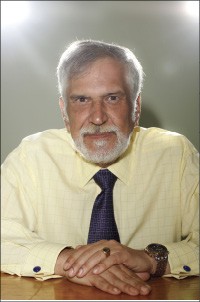Every great innovation starts with a seed of an idea. To that end, we asked nine Memphians this question: If you were given carte blanche to make whatever changes in Memphis you thought were needed, what would you do?
They talked about education, race relations, music, poverty, and crime, but, most of all, they talked about the possibility of what could be.
Rachel Hurley
Local blogger and Internet radio host
WUMR 91.7 FM is the radio station run by the University of Memphis. At present, it has an all-jazz format. I may be going out on a limb here, but I have doubts that the station is very popular among the school’s students.
If I had the power, I would change WUMR to a station with a more eclectic format. I would keep some of the programming but would update the majority of it to music genres more popular with the school’s student demographic.
I’ve been told time and time again that the lack of a college radio station with any kind of finger on the pulse of the local or national independent music scene hinders us, not only in bringing acts to the area (college radio playlists are often used to forecast the popularity of musicians before they book their tour), but it leaves the entire region to be influenced only by the bland, uninspiring, over-programmed corporate radio that crowds our dials now. Shouldn’t we expect a little bit more from our university station?
This city screams to the world at every opportunity that we are the “birthplace of rock-and-roll” and “home of the blues,” but it rarely works toward instilling the pride that should come along with that into its own citizens.
Maybe our student population is a good place to start. Every time I come across a Daily Helmsman (the U of M’s student newspaper), I see 18 stories about the Tigers, but rarely do I see three words written about any type of music going on in Memphis. The median age of the people I come into contact with at local rock shows is 30. The 18- to 24-year-olds who should be filling these shows seem to be uninformed about the great venues and local talent that flood this city.
There was a study released not too long ago that revealed three major growth markets in Memphis. One was distribution, another was biotech, and the last was music.
A well-programmed, well-connected station run by students with a passion for our homegrown music could have an exponential effect. When it comes to the business of music in our fair city, Memphis needs to go back to school.
Mario Lindsey
Assistant category manager, AutoZone
I think it would be a good idea to have affluent people, especially those who move back into the inner city — Uptown, South Bluffs, Harbor Town — send their children to public neighborhood schools.
If they put their kids in public schools, maybe it would influence other children who go to those schools and increase test scores. I talked to a friend about this, a parent of a middle-schooler, and she said you’d be asking parents to sacrifice their kids and put them in bad elements.
I agree that it may initially have a negative effect on their child, but at some point you have to realize the only way to improve these failing schools is to improve the students who go there. One of the ways to do that is bringing in better students, who can influence the other kids. We also need a requirement to teach basic financial education. We don’t do enough to teach kids in school about bank accounts, balancing a checkbook, credit reports.
Schools also need to teach kids how to be a parent. If you have a young mother who never learned how to be a mother, when her children have kids, are they going to know how to be a parent?
Finances, parenting, and household upkeep were once taught at home, but these days, children aren’t receiving these things.
I believe we need consolidation, but if the city cannot get the suburbanites to agree, the city should withdraw from Shelby County.
Something else we need is a cause. I mean that on two different levels: The black community needs a cause. Once upon a time, when black folks were treated like second-class citizens, we were forced to work together to overcome injustice.
Though we have many problems now, there is no unifying cause that brings the black community together. You could say the same thing for the whole Mid-South.
I don’t have that many white friends that I can call up and say let’s go hang out. When I was working on the Herman Morris campaign, I met some folks I could probably have created friendships with, but I didn’t pursue it. That’s just human nature. I understand it, but we have to overcome our prejudices to learn from people from other cultures. I just wish there was something we could talk about, because we’re all on the same side of something as Memphians. This city is a city of division, and that’s a shame.
Something that might work is if the Grizzlies were making a championship run. The Grizzlies have a rare opportunity that no other one entity in this city has. Grizzlies crowds are the most diverse in the city. It’s amazing to see.
It’s like a rare moment where we come together as a community. I want the Grizzlies to do a better job of marketing, and hopefully, they’ll make the right choice in the draft.
A lot of affluent white folks, they were big fans of Shane Battier. Shane Battier wasn’t as popular with black fans. We liked Bonzi Wells, Stromile Swift, Jason Williams, and James Posey. We need a player that everybody can get behind, kind of how Derrick Rose, CDR, and Joey Dorsey were for the Tigers.
I think that everybody is concerned with the Grizzlies moving away and hating on the owner. The fact is, if more people went to the games, it wouldn’t matter who the owner is because they would spend money on the team because they’re making money.
Richard Janikowski
University of Memphis professor,
criminologist behind MPD’s Blue Crush initiative
Across the nation, including in Memphis, concern is increasing about a rise in violent and gang crime involving young people. Law enforcement is actively responding with new proactive initiatives, including the Memphis Police Department’s Blue Crush strategy, creation of the Real Time Crime Center, and implementation by the Shelby County Sheriff’s Office of Data Smart policing.
 by Justin Fox Burks
by Justin Fox Burks
Rachel Hurley
However, while we must address criminal conduct through aggressive, focused law enforcement, we must also take care not to assume that law enforcement can by itself “solve” the problem of crime. Policing initiatives may suppress criminal behavior in the short-term, but long-term crime reduction requires a comprehensive strategy targeting community building and the healthy development of our youth.
Juvenile crime is not an isolated event. Most often, the roots of crime start during a child’s early years. When it happens, it is the culmination of a process that has gone on for a long time — a process rooted in our families, schools, neighborhoods, and society.
As my colleague Leon Caldwell has observed, we often look at a child as something needing fixing, when we should instead be looking at our “village” and trying to understand what in it needs fixing. The young people committing crimes are the same youth who are failing in school, truant, experimenting with drugs and alcohol, hanging out with antisocial peers, and alienated and isolated from the values and institutions of society. The conditions that foster these behaviors, including neglect, abuse, and poverty, are our responsibility. Children can’t fix the village, but we can.
All children are born equal, but all children are not born with equal opportunities. We can and must do something to rectify this inequality.
We must make a commitment to every child having strong early years by ensuring access to parenting, education, home visitation, early childhood education, nutrition, health services, and a safe home and community. Research by Syracuse University on a comprehensive program providing these services to pregnant mothers and children to age 5 revealed that by age 15, only 6 percent of the children in the group receiving these services had juvenile records. In contrast, of a comparison group of children not having access to the program, 22 percent had juvenile records and 10 percent had become chronic offenders by age 15. Additionally, we know the intervention programs that are needed: after-school activities, youth development, wraparound case management, prevention of child abuse and domestic violence, and good jobs and decent housing for families.
Almost 50 years ago, John F. Kennedy reminded us to not ask what your country can do for you, but what you can do for your country. Today, the first day of our future, the question is: Will we make a comprehensive commitment for the sake of our children to take the steps necessary to fix our village?
Martavius Jones
Memphis City Schools board member,
president and financial adviser of Jones Wealth Management Group
The first thing I would do to move Memphis forward would be to consolidate the governments and school systems of Memphis and Shelby County. Once consolidation is achieved, I would levy a commuter tax on the residents of neighboring counties who enjoy the amenities of a major city, but whose property taxes and sales taxes benefit surrounding counties instead of Memphis and Shelby County.
I would then charter a bus for the 132 members of the Tennessee General Assembly from Nashville to Tunica, Mississippi, and West Memphis, Arkansas, on any normal weekend to give the members an idea of how much Tennessee money is benefiting our bordering states. Having a first-hand account should motivate the legislators to allow gaming in Memphis.
Because gaming and other “sin industries” (namely, alcohol and tobacco) consider taxes a customary cost of doing business, I would tax casino revenues at 30 percent and mandate that 10 percent of the 30 percent is earmarked for education. The state of Tennessee would receive 10 percent, and the remaining 10 percent would be rebated to residents of Memphis and Shelby County in the form of a reduction in property tax rates.
The first priority for additional education funds would be to lower the pupil-to-student ratio by hiring more teachers and increasing teacher pay. I would extend the school day and provide more extracurricular activities.
For endorsing the plan, all citizens of Tennessee would benefit, because 10 percent of revenues would go into the state’s coffers.
Tom Jones
Smart City Consulting,
primary author of Smart City Memphis blog
At the risk of being branded for civic heresy, I’d like Memphis to adopt Nashville’s attitude. I admit that I’ve never really “gotten” Nashville, but I nonetheless grudgingly admire something imbedded in its civic culture — ambition.
I was in Nashville shortly after its school district was placed on the state’s “high priority” list. There was a palpable outrage among city leaders that such a thing could happen there, and they vowed to do something about it. Here, more than 100 of our city schools do not meet state benchmarks, but there’s a pervasive sense that that’s just the way things are in Memphis.
In Nashville, better decisions flow from this ambition and sense of purpose. Its political and business leaders simply refuse to accept second best or any suggestion that they shouldn’t set national standards. It’s hard to imagine a Bass Pro Shop inhabiting a signature building there.
When Nashville wanted to build a symphony hall, it did not append one onto a convention center so it could finagle hotel-motel taxes. Instead, it built a symphony center that is a monument to its cultural commitment. When it came time to build a new central library, it built it as a reminder of the importance of urban design — and downtown.
The magic in Nashville isn’t the result of consolidated government. Rather, the magic is found in a special strain of leadership that brings all civic resources, public and private, to the table to solve problems. And yet, Memphis needs consolidation, not because of promised savings that are unlikely to materialize, but because we need to do something to shake up the status quo and send the message to the rest of the nation that things are changing here.
We begin by being brutally honest, because troubling national indicators should inspire a new sense of urgency and a new way of thinking. We need action on all fronts. We need Highway 385 to be a toll road. We need to attack teenage pregnancy by getting serious about handing out birth control. We need to eliminate all tax incentives for low-wage, low-skill jobs. We need to find the best urban school superintendent and pay whatever it takes to get that person here. We need to get more city school students to college graduation, because they are the best predictor of our future economic success. We need to transform our riverfront from a stage set trapped in time to a vibrant magnet for talent.
We need to rationalize our tax structure. It’s simply not right that the less you make in Memphis, the more you pay in taxes as a percentage of income. It’s intolerable that city taxpayers pay a disincentive to live here and pay for programs and amenities that are regional in nature. If we move regional services to the regional (Shelby County) tax base, the Memphis tax rate can be comparable to Germantown’s.
These things don’t require that much money. They do, however, require ambition.
Phyllis Phillips
Program manager for MIFA emergency services
Maybe we need to develop a program to empower people here to help with their self-esteem and make them want to live better.
So many of the people I encounter through my work feel like they need to stay stuck in a job at McDonald’s. We need a way to make them want to get a better job, even if it means going back to school or learning life skills.
It could be a training program or an empowerment class. We could do it through churches, just to give people that extra get up and go.
Working here at MIFA, I see a lot of people who are going through a crisis because they aren’t able to pay their bills. I see a lot of hopelessness. They’re depressed. They often say they don’t know how they’re going to make it tomorrow. They need some positive reinforcement.
My other thing is high taxes. We have all this surplus money from the lottery; why can’t we use some of that surplus money for schools and taxes? The taxes are killing us here in Memphis.
 by Justin Fox Burks
by Justin Fox Burks
Richard Janikowski
My husband used to work in New York, and they had tolls. Maybe we could have a toll for those people coming into Memphis to work. If you live in Mississippi or Arkansas and you come to Memphis to work, you pay a toll.
Lucia Heros
Owner, Café Las Flores coffee
Giving children access to a great education, enriching programs, and emotional and spiritual support should be a priority for this community. So much depends on the core family unit, and yet the stability of family life seems to be more at risk than ever in our society. Taking care of our little ones now is the best guarantee to help them grow into responsible, caring, and successful adults who will in turn make this city a better place for future generations.
I am amazed by the many worthy organizations that struggle on a day-to-day basis to keep their programs afloat. Identifying these nonprofits and helping them meet their financial goals should be the responsibility of every citizen and our government. Especially in these times of economic crisis and cutbacks, let’s not lose sight of those doing the important work of helping our kids get a better head start in life.
Take the Children’s Museum of Memphis, one of the few places where families from all walks of life can bring their kids for a few hours of fun, play, and learning. Wouldn’t it be great if the museum could have greater access to funding, which would allow it to bring in more national exhibits and speakers, expand its facility, events, and programs, and bring their brand of fun learning to our schools?
Another organization changing the lives of kids in Memphis is the Exchange Club Family Center, dedicated to breaking the cycle of child abuse and teaching families how to heal from these dysfunctional patterns. What if the center had more money to provide counseling for more families and the professional support that these kids need in their time of emotional crisis? Dealing with abuse and healing those wounds as early as possible teaches kids important values of respect and safety and stops the cycle of violence that often begins at home.
Let’s be cheerleaders for our kids by supporting the dedicated leaders and organizations that are already doing this work every day. We can supplement and enrich our kids’ lives with safe and positive diversion and the programs that they need to help them have a more nurturing childhood experience. We have nothing to lose and only happy, well-adjusted children to gain!
Andrew Couch
Executive director, West Tennessee Clean Cities Coalition
When I think about Memphis, I think of a city that is okay. If you leave education, leadership, and crime out of the discussion, we’ve got a mostly all right place to live.
Our air quality isn’t perfect, but it isn’t that bad. Our water is clean(ish) when compared to other cities. Our commute times are not that bad. We’ve got loads of open space nearby, loads of parks, a giant river, easy access to great food and live music, and we’re not very far from larger cities like Chicago, Atlanta, and New Orleans. So what needs to change?
If I could change anything about Memphis, it would be this: I would ever so politely ask the majority of my co-inhabitants here to take another look. There is a problem with our way of life, and it has nothing to do with global warming, hippies, environmentalists, terrorists, or the president.
This city is becoming a dirty, sprawling, and increasingly homogenized Anytown, USA. Why do we need so many Walgreens, so many lousy identical strip malls, and so many poorly and inefficiently built homes so far out into what was once perfectly pleasant woodlands?
Why do we need these giant vehicles to lug our overweight and malnourished bodies all over the once-beautiful town that we are ruining with such lousy and culturally neutral garbage? Why is there so much litter on our streets? To quote my favorite writer, J.P. Donleavy, we’re “teaching the landscape an ugly lesson it will never forget.”
Here are a few extraordinarily simple ideas that I would like to share:
1) Stop building crap. By crap, I mean cheap, ugly, inefficient buildings that age poorly and look worse than the building you tore down.
2) Stop tearing down old buildings to build crap. See above.
3) Stop building so many parking lots. If you have to build a parking lot, put it behind the building.
Once the building is required to bear its regrettable face to the street without a parking lot to bear the brunt of the offense, you may just decide that your building looks like crap and subsequently redesign.
4) Get out of your car every once in a while. Take a bus, ride your bike, or ride in someone else’s car for a change. The Health Department has a wonderful ride-share program that works great.
5) Stop throwing trash on the ground.
My wish and vision for Memphis is one that is simple and attainable in the near-term: a town that has preserved its identity, stopped being so wasteful, and cleaned up its mess.
Divine Mafa
Owner, Divine Rags
I think the important thing is to retain young folks. They don’t see Memphis as a place they can realize the American dream, so as soon as they graduate they are thinking about leaving the city to go to Chicago, New York, Los Angeles, or Atlanta.
 by Justin Fox Burks
by Justin Fox Burks
Lucia Heros
We need a government that understands how to create good jobs by bringing in the right companies and rebranding the city not just as a distribution center. When you do that, you are telling folks that we are here to ship boxes. To advertise that as the fabric of our economy is a travesty.
We could be known as the retail center of the Mid-South, where people from the whole Delta region come and do their shopping. That creates a lot of tax revenue. We’re already known for distribution; we could capitalize on that aspect.
Because the dollar is so low, I believe Memphis and Shelby County should establish its own currency to build its own micro economy and shield itself from a failing economy. Restaurants and retail businesses will accept this concept because it increases spending, pride, and awareness of the efforts of local businesses.
Faces of local legends and natural wonders of the county can be on the local currency. Local artists and students could design the currency. This is also a great way of making our resources known to tourists.
When investors come to Memphis — for whatever reason — they see dilapidated buildings. We don’t have anything that attracts people to say, “I want to invest in Memphis,” because all they see is blight.
Any city that is successful has a nucleus. It has a downtown that is functional, and then its energy begins to radiate to the surrounding areas.
We should have a homeless meter. People will always give to the panhandler, but the money goes to booze and drugs. The solution? Parking meters, in high-foot-traffic areas where panhandlers frequent. Educate Memphians and tourists to put loose change in the meter instead of handing it over to the panhandler. The money collected from the “homeless meter” will then be distributed to charities and organizations that assist with homelessness and hunger prevention.
And make sure that people who own vacant buildings have to do something to make them occupied. If you are keeping a building undeveloped in an area that’s economically depressed, you need to be accountable to some extent.
Memphians continue to be dependent on other people to come in and save them. We need to get up sometimes and do it ourselves. I’ve been in the medical field for the past 15 years. I said, I need to do something positive. I want that building. It’s a corner space. I said, I’m going to turn it into a clothing store.
Three months later, it was a clothing store. It was idea, talk, then action. Done. Now I see another vision: transforming the South Main district into a fashion district.
It doesn’t take long to transform a building. Three months from now, Memphis could be looking beautiful enough to attract investors if people are willing to do something about these ugly buildings that are sitting around here.


 by Justin Fox Burks
by Justin Fox Burks  by Justin Fox Burks
by Justin Fox Burks  by Justin Fox Burks
by Justin Fox Burks